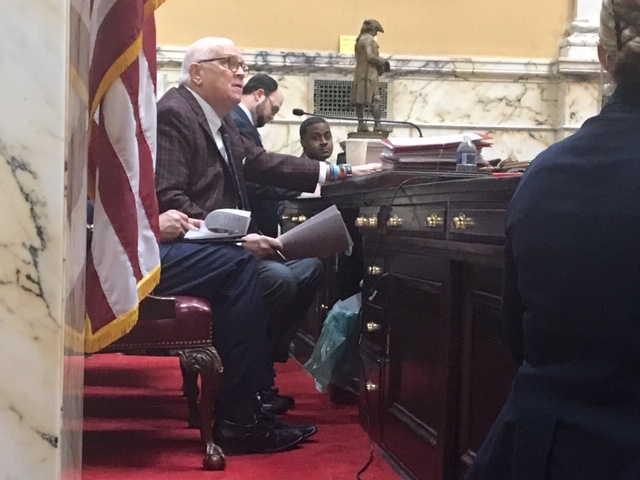Josh Kurtz: When the CEO Is Ailing and the Heir-Apparent Is Out on the Street

On any given morning in Annapolis, if you walk around State Circle or Church Circle, blinking into the sunlight, you can temporarily convince yourself that the center of gravity in the Maryland Senate hasn’t changed.
On your perambulations, or while you’re ordering a sandwich at Subway, or picking up a spud at Potato Valley Cafe, you might run into Mac Middleton or Jim Brochin or Jim Mathias or Edward Kasemeyer. It takes a minute to realize that none is in the state Senate anymore.
Middleton, the former chairman of the Finance Committee, lost in the Democratic primary last year and is now lobbying for the Maryland Auto Insurance Fund. Mathias, who lost his seat in the general election, just recently signed on to lobby for the University of Maryland Eastern Shore. (Because Mathias and Middleton are working for government entities, the rule preventing lawmakers from lobbying their ex-colleagues for a full year does not apply.)
Brochin, who gave up his Senate seat to run unsuccessfully for Baltimore County executive last year, is now doing contract work for the Hogan administration, focused on juvenile Justice issues. And Kasemeyer, who retired last year after serving as chairman of the Senate Budget and Taxation Committee, still makes the scene in Annapolis from time to time, in the company of his wife, lobbyist Pamela Metz Kasemeyer.
These former lawmakers were Democratic centrists, and they helped ground the Senate in the comfortable middle. Now, their absence epitomizes the changes taking hold there this year.
There are 18 new senators in the 47-member chamber this year, including 14 new members of the 32-strong Democratic caucus. Of the new Democrats, all but one is to the left of his or her predecessor.

The defeat of former Sen. Thomas M. “Mac” Middleton may prove to be the most pivotal Maryland political development of 2018.
It may come to pass that the most significant election of 2018 was Middleton’s loss in the Democratic primary to Arthur Ellis. Middleton for years was considered the heir-apparent to Senate President Thomas V Mike Miller Jr. (D-Calvert).
But tell the truth, no one could really ever see Miller, now in his 33rd year as president, leaving. That changed in January when he announced he was undergoing chemotherapy for stage 4 prostate cancer.
Think of the state Senate as a family business. The family patriarch, the longtime CEO, was firmly in control. But the rank and file members – the kids – never really had to think about succession because their slightly younger uncle was ready to take over, if only for a little while.
Now, with Middleton gone, there is no obvious successor to Miller. And that plunges the state Senate into an unprecedented period of nervousness and uncertainty.
No one is quite willing to talk about it – at least not publicly. But the conversation is happening in hushed tones, and it’s uppermost in the minds of many senators – even this week, the busiest of the 90-day General Assembly session.
Everyone is on the lookout to see whether and how their colleagues are starting to jockey for position. Every close vote in committees and on the Senate floor becomes meaningful: Who’s lining up with who? Are discernible alliances emerging?
It’s a stark contrast to the House of Delegates, where the race to replace Speaker Michael E Busch (D-Anne Arundel), whenever it happens, has been plainly apparent for years. The two leading contenders are assumed to be Appropriations Chair Maggie L. McIntosh (D-Baltimore City) and Economic Matters Chair Dereck E. Davis (D-Prince George’s), with Speaker Pro Tem Adrienne Jones (D-Baltimore County) and Environment & Transportation Chair Kumar P. Barve (D-Montgomery) among the plausible alternatives or compromise candidates.
Anyone who follows the Senate even semi-closely could probably sketch out a list of half a dozen or so possible contenders to replace Miller. It would include at least three committee leaders – Budget and Taxation Chair Nancy J. King (D-Montgomery), Education Health and Environmental Affairs Chair Paul G Pinsky (D-Prince George’s), and Judicial Proceedings Chair Robert A. Zirkin (D-Baltimore County). It would also include a couple of committee vice chairs, Sen. Bill Ferguson (D-Baltimore City) of Budget and Tax, and William C. Smith Jr. (D-Montgomery) of Judicial Proceedings, plus Majority Leader Guy Guzzone (D-Howard).
Conventional wisdom says that Guzzone may have the best shot. He has given generously to his colleagues, he is acceptable ideologically to a broad spectrum of his caucus, and he’s from Howard County, the Switzerland of Maryland.
He would certainly represent change from Miller – he’s an old Sierra Club state director – but not too radical a change. He’s been around government and politics a long time: 20 years as an elected official, and before then, a staffer in Howard County government and on Capitol Hill.
But I’d submit that when we’re talking about the next Senate president, someone to replace a man who has led the chamber for two generations, conventional wisdom flies out the window. There is no telling if the norms and traditions that have defined the way business is done in Annapolis, and particularly in the Senate, will continue to apply.
Will there be pressure on Democrats to appoint a young president, a progressive president, a woman or an African American? Will senators want a short timer or someone who can build a level of impenetrable seniority, the way Miller did? Will regional tensions come into play? Will coalitions develop? Will deals be cut? Are they being cut as we speak?
Miller has become a venerated figure in Annapolis, but that hardly means his underlings will be looking for another Miller-like figure to replace him.
And honestly, the same set of questions applies to the House. Busch too is a venerated figure — even more beloved, on a personal level, than Miller. And while we think we know how succession might go — whenever that happens — there’s enough uncertainty to say conventional wisdom here too may fly out the window.
We are in uncharted territory, folks.




 Creative Commons Attribution
Creative Commons Attribution